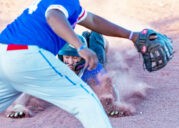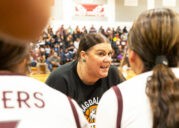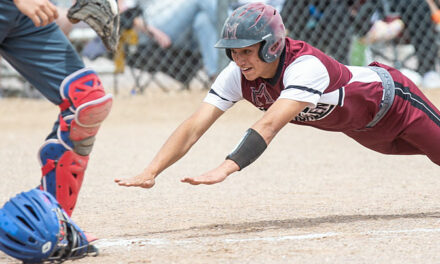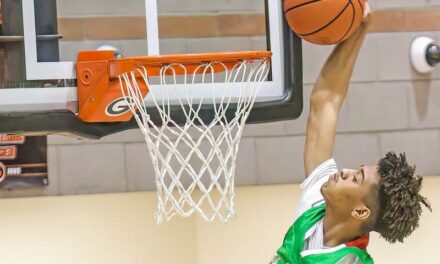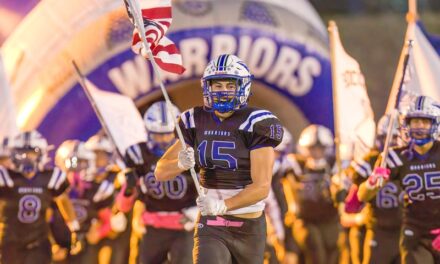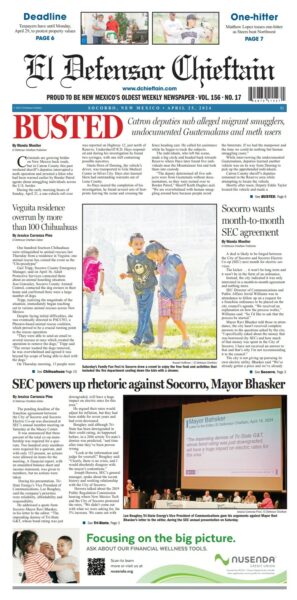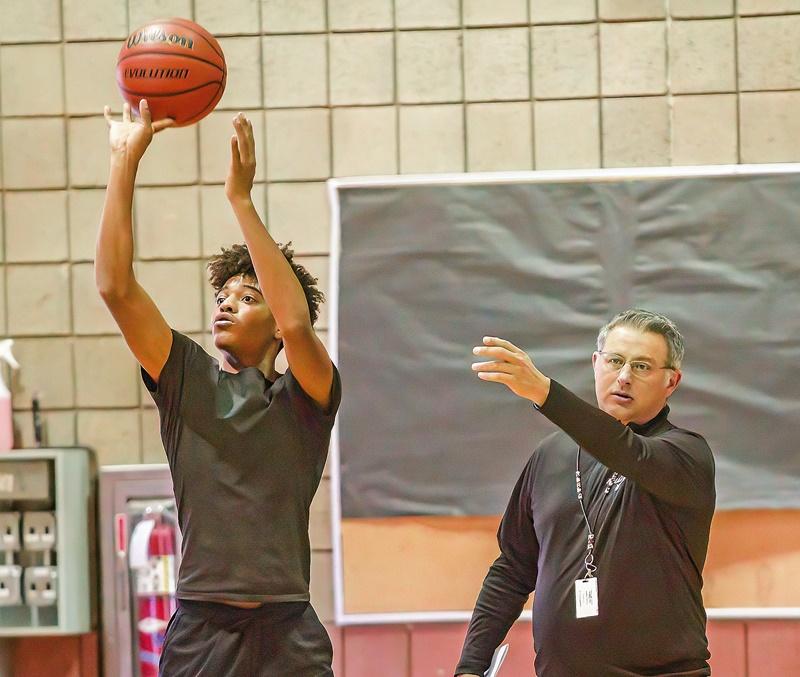
Senior D’Shaun Vinyard fires a shot as coach Jory Mirabal explains a drill.
Russell Huffman | El Defensor Chieftain photos
Walking into an ongoing Magdalena boys basketball practice feels like walking into a church after the sermon has started. The athlete’s eyes turn to see who is in the doorway and then back to the “minister.”
As head coach Jory Mirabal talks to his players, there are no dribbling basketballs and no talking. All eyes are fixed upon the coach as he explains what he wants. Mirabal doesn’t have to speak up because there’s not a peep. The players’ attention is 110 percent.
The players are broken down into groups of three and work on a defensive drill, and once Mirabal makes his point, the hardwood becomes a kaleidoscope of action.
The practice’s energy rises from fever-pitch to dead zero each time Mirabal blows his whistle.
Building the Foundation
Rome wasn’t built in a day, and neither was the Magdalena boys basketball program, which has enjoyed a decade of dominance under Mirabal. Since the 2012-13 season, the Steers are 267-41 overall and a stunning 100-3 in district play.
It’s hard to fathom a 15-0 season two years ago, dropping the Steers’ 10-year winning average from 28 wins a season to 26.7, but Magdalena made up for it by winning the Class A state title.
Last year’s 31-1 title run (Magdalena has three state championships) was more aligned with fans’ expectations.
It wasn’t like the Steers were terrible in their previous years, but three winning seasons had produced a pedestrian record of 74-64 and being average isn’t what Mirabal is about.
When Mirabal is asked if he realizes his teams are 100-3 in district play over the last decade, the answer reflects the Steers’ mission each basketball season.
“Really, a 100-3? I mean, but those are just district games,” Mirabal said.
He’s not discounting his league’s competition.
It’s just that Magdalena has moved past worrying about district games, and with 30 percent of the Class A state titles over the last ten years, winning a district is only the first step in having a successful season in Steer country.
Magdalena stopped hanging up district banners when Mirabal took over in 2008. “That first season, we were probably like 3-13 going into district. I honestly don’t remember (it was 3-14), and I had one of the kids ask me if we were going to put up a district championship banner, and I was like, no,” Mirabal said. “We’re not about district championships. We are looking at a bigger picture.”
The Steers finished that first season in second place, so there was no need for a banner, and Mirabal has stayed true to his course. The last banner noting a district title is dated 2007. There has been some talk about updating the gym. After all, there’s nothing like an opponent walking into a gym and seeing that kind of hardware. It makes the team realize whose house they have entered.
“We’re talking about doing some remodeling and giving some recognition to some of our teams. I’m not saying district championships aren’t important, but we want our players to have greater expectations,” Mirabal said.
Winning has become a byproduct of what Mirabal wants out of his athletes, and he’s proven it over the years.
Greater Expectations
Having greater expectations was instilled into Mirabal by his family. His Uncle John would pull him aside to discuss mistakes, and his grandparents (Idella and Joseph Nicholl) made him toe the line when he was visiting.
The visits turned to his grandparents raising him, and it helped pull him out of the vagabond lifestyle his parents were in (Mirabal has lived in 13 different states). Still, it didn’t erase the resentment of not getting to play basketball at the schools he had attended.
“I could play, and at the time, I was very hardened over the fact that I wasn’t getting to play, but now as a coach, I look back, and I wish I could go back and maybe apologize because I bet my attitude wasn’t that great,” Mirabal said. “I was kind of fiery. I couldn’t see why I wasn’t playing.”
There is an almost minute-long pause when Mirabal is asked who his most significant influences were.
Thoughts of great coaches, some of his coaching heroes, John Wooden and Dean Smith, go through his mind, but before he talks about those legends — he wipes away a tear and answers, “my grandparents.”
Mirabal found it easy to share his thoughts with his grandmother. After having played a total of 43 seconds over five games one season, he used her as a sounding board to express his displeasure about a coach who wasn’t recognizing what he believed were his many talents.
To Mirabal’s surprise, after listening to his laundry list of reasons he thought he should be playing, grandma didn’t agree with his assessment of the coach.
“We could always share each other’s opinions. And my grandmother said, ‘You know what, son?’ That’s how she always referred to me as ‘son.’ ‘I’ve known him since he’s been born. I know that coach, and I know one thing, if you’re too good to keep off the floor, he’s going to play you,’” Mirabal said.
It wasn’t what he had been expecting to hear.
“I kind of thought, what the heck? You’re supposed to be on my side. She could have gone up there and scolded the coach, thrown a fit, and told him this poor kid has a tough situation and all that,” Mirabal said. “She didn’t take that route. But she did send me to a bunch of basketball camps that summer.”
As the church librarian, grandma also had keys to the gym, and along with each shot made, he flaked off a little bit of his new kid-on-the-block hardness.
“I’d play and shoot and work on my game, and so I think a lot of my attitude, my approach to life came from my grandparents,” Mirabal said.
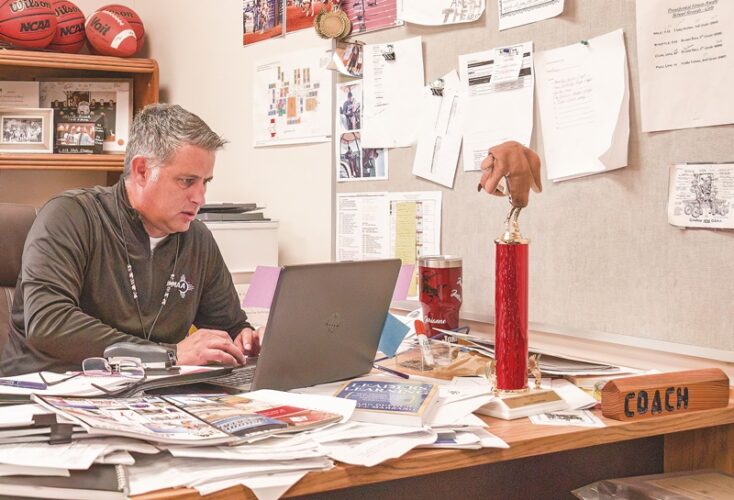
There’s always paperwork for Coach Jory Mirabal who also serves as Magdalena’s athletic director.
A Little Slice of Heaven
Mirabal’s early basketball coaching career took him to Wyoming. On a trip home to visit his grandparents, Mirabal realized they had come to an age where it was time to pay for his raising, so he moved back to New Mexico and began coaching in Ramah.
Mirabal’s life could have gone in many different directions. The program he has built shows he has the talent to coach at a much higher classification, and somewhere across the country, a college would like to have him around. There’s regret in Socorro that the high school passed on him when they had him under its roof.
Instead, Mirabal lucked out and cut out his little slice of heaven where he met his wife, Mary Anne. Together, they blended a ranch/rodeo and sports lifestyle into one family unit.
All three of their sons, Jorrell, Jaxson and Joren, have had success on the court, and they are steady cowboys, too.
“We will be shipping cattle to market tomorrow,” Mirabal said. “My wife’s family is from here. When we first got married, she wanted to live at the family’s ranch, and she wanted our kids to be raised like she was raised, and I was down with that.”
Mary Anne has also shown her willingness to see her husband succeed and, during the first lean years, suggested fresh-baked cookies might make the Steers play harder.
“I was willing to try it because she makes excellent cookies, and the boys knew it,” Mirabal said. “Then it just turned into after every home game — there are bags of cookies for the boys.”
Coach Clay Clark has been Mirabal’s assistant since the start of his head coaching career, and it wasn’t the usual route most coaches take in recruiting someone.
Still, basketball knowledge and the ability to translate it are hard to find.
“He was working here in town and owned a feed store. And at that time, I was teaching in Socorro and coming up here, and I’d visit with him because I’d get out of school before these guys are out and wait for my wife,” Mirabal said. “I was talking to him and saying I think we can have a good basketball team. There’s a basketball tradition, and they (the fans) love basketball, and I’m going to need an assistant coach.”
Clark was eventually talked into pursuing his teaching degree and, along with coaches Sara Sue Onley and Fran Ganadonegro, have helped Mirabal build an athletic program that focuses on more than just winning games.
“Our focus has been about being champions. It’s not about winning championships. I want these kids to live a life — to be the type of person that every day you’re a champion of what you do. Every day you’re living up to that standard or code, whatever you want to call it, and it’s not about a culminating event where there’s a championship, and oh, now I’m a champion,” Mirabal said. “It’s about who I am as a person, and when everything else happens (like championships), it happens as a byproduct of who you are.”
Almost half the school’s boys have signed up to play basketball, and they can’t all be starters, but in the Steers’ system, a bench warmer’s role can be just as essential and missed as much as when a 30-point per game also graduates.
What does it take to play in Magdalena?
“It takes a good attitude, commitment, dedication to the program, and conducting yourself as a good person on and off the floor. For you to take pride in who you are. We’ll fix the other stuff. We have a way of doing something that revolves more around behaviors. Attitude and effort count more than X’s and O’s,” Mirabal said. “X’s and O’s, I feel that’s the easy part. That’s my job. But to play for us, you have to come with a certain mentality, and we start with that, so everything else falls in place.”
It took patience for Magdalena to build the foundation of its program, but when Mirabal’s first seventh-grade class were seniors, they led the Steers to a 25-4 record and an 8th-place state ranking.
Magdalena didn’t lift the state title that year, but the seniors on that team rose to the most significant challenge Mirabal put before them, and that was establishing their identities and roles on the team.
Mirabal issues the same challenge every year.
“Our biggest challenge this year is for this group of seniors to put their individual identities on what this season is going to be, deciding who’s going to be a leader, how to be a leader, what their mark on this program is going to be,” Mirabal said.
Perhaps most of all, he wants his team to know that the town of Magdalena is behind them because he can remember the days when after the girls’ game, the gym pretty much cleared out.
“I want these kids to feel the excitement of going out in front of a big crowd and people getting behind them and knowing that when you get on that floor, you can compete. That is your moment,” Mirabal said. “Our community and school have worked together and have made us who we are in Magdalena.”
